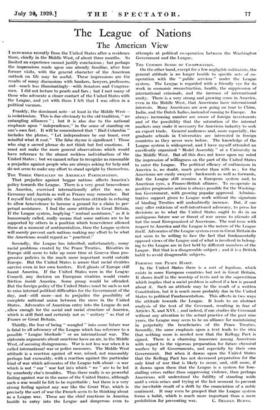FORMING THE PEACE HABIT.
In the United States there is a sort of legalism, which exists in some European countries but not in Great Britain. It shows itself in the worship of texts and in the superstition which implies that a social problem is solved if a law is passed about it. Such an attitude may be the result of a written Constitution, but it is much more probably due in the United States to political Fundamentalism. This affects in two ways the attitude towards the League. It leads to an abstract analysis of the text of the Covenant, resulting in fear of Articles X. and XVI. ; .and indeed, if one studies the Covenant without any attention to the actual practice of the past nine years, the League may seem to be an alliance for maintaining in perpetuity the beneficiaries of the Peace Treaties. Secondly, the same emphasis upon a text leads to the idea that nothing more is needed now that the Kellogg Pact is signed. There is a charming innocence among Americans with regard to the vigorous preparation for future chemical warfare by all Governments, and especially by their own Government. But when it dawns upon the United States that the Kellogg Pact has not decreased preparation for the only kind of war that is likely to occur, and, still more, if it dawns upon them that the League is a system for fore- stalling crises rather than suppressing violence, then perhaps Americans will understand the futility of standing aside until a crisis arises and trying at the last moment to prevent the inevitable result of a drift by the enunciation of a noble sentiment. It may even be grasped that the League system forms a habit, which is much more important than a mere
prohibition for preventing war. C. DELISLE BURNS.
















































 Previous page
Previous page